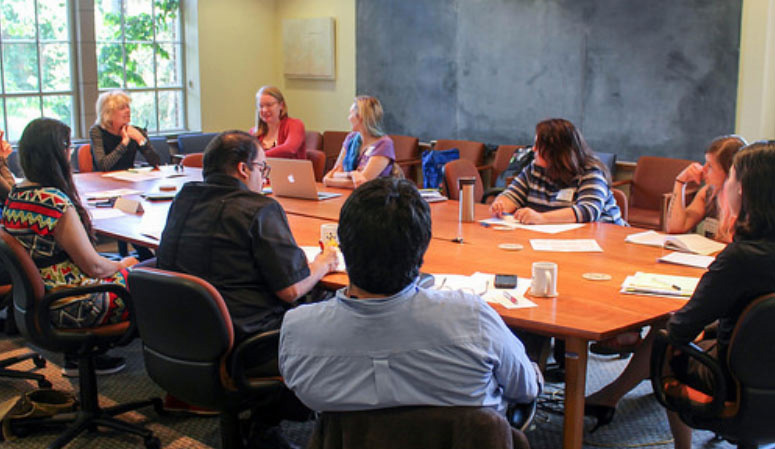About Us

The Simpson Center for the Humanities seeks to advance vital research and spirited intellectual exchange on questions of broad and pressing concern through and across the academic fields of the humanities and the humanistic social sciences. As a research unit within the Humanities Division of the College of Arts & Sciences at the University of Washington, the Simpson Center supports scholarship that draws on the core areas of humanistic inquiry and beyond.
Society of Scholars
The Society of Scholars is an intellectual community of humanists of diverse generations, academic ranks, and departmental affiliations who contribute to and learn from one another’s work. Each year, approximately eight faculty and three dissertation research fellowships support members of the Society of Scholars who are working on major scholarly projects. Visiting scholars in year-long residence at the University of Washington may be invited to participate as well. The group meets biweekly throughout the year to discuss research in progress.
Digital Humanities Summer Fellowships
At the University of Washington the Simpson Center has been central to the emergence and growth of the digital humanities through its programming, opportunities for support, and facilitation of interdisciplinary scholarship. Its support of the digital humanities is inclusive of research and teaching, and the integration of the two. Thanks to the successful completion of a National Endowment for the Humanities Challenge Grant in 2013, the Simpson Center raised $2.5 million to endow the Digital Humanities Summer Fellowship program.
Barclay Simpson Scholars in Public and the Barclay Simpson Prize for Scholarship in Public
With the support of a generous grant from the PSB Fund—the family foundation of Barclay and Sharon Simpson—and matching funds from the University of Washington Office of the Provost, the Simpson Center for the Humanities welcomed the inaugural cohort of Barclay Simpson Scholars in Public in Summer 2021, with new cohorts to be convened biannually in the years ahead. Doctoral student fellows in the humanities devote the summer months to developing public-facing projects in their areas of study and practice and learning from the groundbreaking work of the faculty recipients of the Barclay Simpson Prize for Scholarship in Public.
The Barclay Simpson Prize for Scholarship in Public recognizes excellence in the public humanities, a field that promotes mutually beneficial partnerships across institutions and sectors, providing pathways for scholars to share their work with broader audiences. The four faculty members who have thus far been awarded the prize attest to the rich variety of meaningful public scholarship that is taking place at the University of Washington:
- 2015: Jim Gregory (History), on the history of the civil rights and labor movements in Seattle
- 2017: Michelle Habell-Pallán (Gender, Women & Sexuality Studies), on Latinx artists’ contributions to American popular music,
- 2019: Gillian Harkins (English), on education in prison, and
- 2021: Ralina Joseph (Communication), on convening community discussions on racial justice and systemic change.
Summer Institute in the Arts & Humanities
Beginning in 2002 the Simpson Center has sponsored, with the Undergraduate Research Program, the annual Summer Institute in the Arts & Humanities for upper-level undergraduates, an intensive twelve-credit research course on interdisciplinary topics for twenty students taught by four UW faculty and doctoral students.
Katz Distinguished Lectures
The Katz Distinguished Lectures epitomize the integration of research, teaching, and public engagement for which the Simpson Center has become widely known. The series is named after Solomon Katz, who served for 53 years at the UW, as an instructor, professor, chair of the Department of History, dean of the College of Arts & Sciences, provost, and vice president for academic affairs. Recent lectures include Anna Tsing (Anthropology, University of California, Santa Cruz) on the more-than-human Anthropocene; Chadwick Allen (English, University of Washington) on Native art and literature; and Ruth Wilson Gilmore (Earth & Environmental Sciences, CUNY Graduate Center) on abolition geographies. All Katz Lectures are free and open to the public, and many can be viewed here.
Graduate Research Clusters
Designated annually, Graduate Research Clusters foster crossdisciplinary collaboration and inquiry among graduate students in the form of cross-departmental reading, screening, and/or discussion groups, dissertation working groups, and other activities. Research clusters may organize activities that draw on local intellectual and cultural resources, including faculty and community leaders. In recent years, graduate students have organized research clusters on topics ranging from eighteenth and nineteenth century studies to racial capitalism to the medical humanities.
Graduate Microseminars and Interdisciplinary Graduate Certificates
The Simpson Center is known for its signature program of 1- to 2-credit graduate-level courses taught by distinguished visiting scholars and our own faculty to intellectually augment conferences, speaker series, and the presence of visiting scholars as well as to supplement the curriculum offered by departments. It is also known for supporting the development of graduate certificates in interdisciplinary studies, most recently the newly established Disability Studies Graduate Certificate.